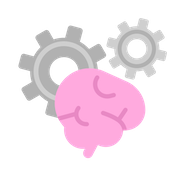Some language learners have really clear motivations (like everyone who signed up for Duolingo’s Italian course after watching Måneskin win Eurovision, but others feel undecided about which language to study. If you’re not sure which one to choose (Duolingo offers 40 languages from around the world!), should you start with an “easy” language? And what counts as easy when it comes to languages, anyway?
Here’s what makes a language easy to learn, so you can decide which language to study next!

Decide what it means for you to “know” the language.
| “Knowing” a language means different things to different learners: do you want to get conversational for a trip to another country? Do you want to get a job that requires you to use the language professionally? Or do you want to watch coverage of the Olympics in Japanese? Keep your own personal goals in mind instead of being intimidated by a “hard” language! To be a confident and effective communicator in a new language doesn’t necessarily mean having perfect grammar or a native-like accent. You can often scrabble your way to conversational proficiency pretty quickly even with “hard” languages. |
 |
“Easy” or “hard” is all about what languages you already know.
We’re apt to transfer from our first language to the new language—that can include vocabulary and grammar (like saying your new Spanish words in the order you’d say them in English). But we transfer other properties, too, like sounds (for spoken languages), handshapes and movements (for signed languages), rules about politeness, and concepts and meanings (what counts as a “cup” versus a “glass” or “mug”? where does “blue” stop and “green” begin?). Transfer can be helpful if the properties are the same across the languages, but can present a challenge if they differ.
Depending on when and how you learned your languages, your brain might treat your second language as a sort of template for all other languages. If you’re learning a third or fourth language, you might actually be more likely to transfer properties of your second language rather than your first!
A language can have a mix of easy and hard properties.
 |
Because languages vary across so many properties (like sounds, meanings, sentence structure, and politeness), learning a new language can be easy in some ways but difficult in others. For an English speaker, the sounds of Japanese might be (relatively) familiar, especially since it doesn’t have tones like Chinese or Vietnamese. But the three Japanese writing systems can be hard to learn, and so can its politeness categories and word order (both really different from English). On the other hand, Chinese has a really challenging sound system for English speakers, but it doesn’t have verb tenses—and that might sound like a relief to any English speaker who is learning Spanish! |
Opportunity and motivation can also make a language “easier.”
How easy a language is to learn will also depend on how easy it is for you to get the tools you need to learn it. Input is language material you can learn from, whether that’s on an app, in a classroom, through conversations in a park, or from watching movies in the language. For example, if you’re an English speaker living in Seoul, it might be a lot easier for you to get good, high-quality Korean input than it is for you to get Spanish input, even though learning Spanish might be easier for you (on average).
Similarly, motivation is really important in language learning, since it takes a long time to build up high proficiency in a language. If you’re highly motivated to learn Norwegian because of family ties or because you want to attend grad school there, it’ll be easier for you to stick with it, compared to an “easier” language that you are less interested in sticking with for many months and years.
Overall, it’s typically easier to study a language more similar to the one you know best.
If you speak one of the over 100 language isolates without a close relative, this tip won’t be very useful. 🥲 For English speakers, that means many languages from Europe (like Spanish and German) will be easier to learn on average than languages that aren’t related to English at all (like Arabic and Chinese) because Spanish and German are more similar to English.
But even this can be murky! For example, the English language is more closely related to German than to French: English is a Germanic language, while French is a Romance language that evolved from Latin, like Spanish and Italian. However, due to invasions and geographical proximity of modern-day France and England, many of the English words we use today were borrowed from French—so today, English shares quite a bit of vocabulary with French, even though grammatically, English has a lot more in common with German!

No matter which language you decide to study, the most important part of learning a new language is sticking with it. Set practical, personal goals for your learning, and then make studying a regular habit that you can do a little at a time, for a long time. And check out these tips for learning for the long haul!
